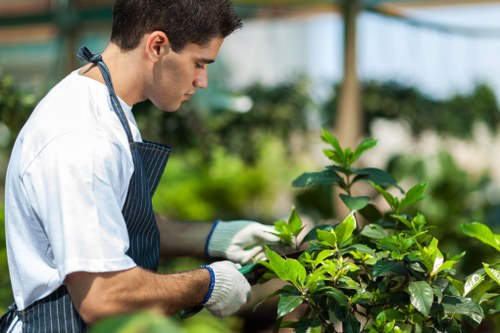Effective Driveway Algae Removal in Oakleigh Park

Maintaining a clean driveway is essential not only for aesthetic appeal but also for the longevity of your property. In Oakleigh Park, homeowners often face the problem of algae growth, which can make driveways slippery and unsightly. Understanding how to effectively remove algae can save you time and money while keeping your driveway safe and attractive.
Algae thrive in damp, shaded environments, which are common conditions in many driveways. Oakleigh Park's climate provides the perfect setting for algae to grow, especially during the wetter months. Ignoring this issue can lead to more severe problems, including surface damage and increased maintenance costs.
Fortunately, there are several methods available for tackling driveway algae. From chemical treatments to eco-friendly solutions, homeowners have a variety of options to choose from based on their specific needs and preferences.

Understanding Algae Growth
Algae are simple plants that thrive in moist environments. They feed on nutrients found in dirt and other organic matter, making driveways with poor drainage ideal breeding grounds. In Oakleigh Park, the combination of occasional rainfall and shaded areas due to nearby trees creates an optimal environment for algae proliferation.
Algae can appear as dark green, black, or even reddish patches on your driveway. While they might seem harmless, they can make surfaces slippery and can be challenging to remove once established. Additionally, algae can hold moisture against the driveway surface, leading to deterioration over time.
Identifying the type of algae present is the first step in effective removal. Common types found in driveways include green algae (Cladophora and Spirogyra), black algae, and slippery algae. Each type may require a different approach for complete eradication.

Methods for Removing Algae
1. Chemical Treatments
Chemical cleaners are a popular choice for removing algae due to their effectiveness. These products often contain biocides that kill algae spores and prevent regrowth. When selecting a chemical treatment, it's important to choose one that is safe for both your driveway surface and the surrounding environment.
Apply the chemical according to the manufacturer's instructions, usually by spraying or applying it directly to the affected areas. Allow the product to sit for the recommended time before scrubbing with a stiff brush and rinsing thoroughly.
While chemical treatments are effective, they should be used with caution. Always wear protective gear and ensure proper ventilation if applying indoors. Additionally, be mindful of runoff to prevent harm to nearby plants and wildlife.
2. Pressure Washing
Pressure washing is another effective method for removing algae from driveways. The high-pressure water jets can dislodge algae, dirt, and other debris from the surface. This method is eco-friendly as it doesn’t rely on chemical cleaners.
When using a pressure washer, adjust the pressure settings to ensure you don’t damage the driveway material. Start from one end and work your way systematically to cover the entire area evenly.
Pressure washing is best done during dry weather to allow the driveway to dry quickly, reducing the chance of algae regrowth. Regular maintenance with pressure washing can help keep algae at bay.

3. Eco-Friendly Solutions
For those looking to avoid harsh chemicals, there are eco-friendly alternatives available. Ingredients like vinegar, baking soda, and bleach can be effective in combating algae growth without harming the environment.
For instance, a mixture of vinegar and water can be sprayed onto the algae-affected areas. Let it sit for about 30 minutes before scrubbing and rinsing thoroughly.
These natural remedies are safer for gardens and surrounding areas, making them ideal for environmentally conscious homeowners. They also reduce the risk of chemical runoff that can affect local wildlife.
4. Preventative Measures
Preventing algae growth is often easier than removing it. Implementing preventative measures can keep your driveway clean and algae-free for longer periods.
- Improve Drainage: Ensure that water drains properly away from your driveway to prevent excessive moisture.
- Trim Surrounding Vegetation: Reducing shade by trimming nearby trees and shrubs can limit the damp conditions algae need to thrive.
- Regular Cleaning: Sweep and wash your driveway regularly to remove dirt and debris that can support algae growth.

Choosing the Right Service in Oakleigh Park
When dealing with persistent algae issues, hiring a professional driveway algae removal service in Oakleigh Park can be the most effective solution. Professionals have access to specialized equipment and treatments that ensure thorough removal and long-term prevention.
Look for a service provider with good reviews and a track record of success in algae removal. They should offer a range of solutions, from chemical treatments to eco-friendly options, tailored to your specific driveway needs.
Additionally, a reputable service should provide a guarantee for their work, giving you peace of mind that the problem will be effectively resolved. Investing in professional help can save you time and effort, ensuring your driveway remains clean and safe.
Benefits of Professional Algae Removal
- Expertise: Professionals understand the best methods and products for different types of algae and driveway materials.
- Efficiency: With the right tools, they can complete the job faster and more effectively than DIY methods.
- Safety: Proper handling of chemicals and equipment ensures the safety of your property and the environment.
- Long-Term Solutions: Professionals can provide advice and treatments that prevent future algae growth.
Local Areas Near Oakleigh Park
Oakleigh Park is surrounded by several neighborhoods that might also require driveway algae removal services. Here are some of the nearby areas:
- Totteridge: Just north of Oakleigh Park, Totteridge features many residential driveways prone to algae growth.
- Whetstone: A short distance away, Whetstone benefits from similar climate conditions that support algae proliferation.
- Mill Hill: Located to the west, Mill Hill's driveways often require maintenance to keep algae at bay.
- Burnt Oak: Southeast of Oakleigh Park, Burnt Oak experiences wet spells that contribute to algae issues.
- Colindale: Close by, Colindale residents frequently seek algae removal services to maintain their driveways.
- Barnet: Further afield, Barnet shares the same environmental conditions, making algae removal essential.
- West Hendon: To the southwest, West Hendon driveways also deal with persistent algae problems.
- Edgware: East of Oakleigh Park, Edgware's climate is conducive to algae growth, necessitating regular cleaning.
- Cricklewood: South of Oakleigh Park, Cricklewood's driveways often face similar algae challenges.
- Finchley: Another nearby area, Finchley, sees its residents investing in algae removal to protect their properties.
- Edgwarebury: This neighborhood, close to Oakleigh Park, also benefits from professional algae removal services.
- Neasden: Situated nearby, Neasden driveways are prone to algae, especially in shaded spots.
- Colindale Heath: Nearby, Colindale Heath residents often seek effective solutions for algae on their driveways.
- Golders Green: To the northwest, Golders Green's environment supports algae growth, requiring regular maintenance.
- Temple Fortune: Southeast of Oakleigh Park, Temple Fortune experiences similar algae-related driveway issues.
Maintaining a Clean Driveway
Regular maintenance is key to preventing algae from taking hold on your driveway. By adopting a proactive approach, you can keep your driveway looking pristine and safe throughout the year.
Routine Cleaning
Establish a regular cleaning schedule to remove dirt, debris, and potential algae spores. Sweeping your driveway frequently helps reduce the organic matter that algae feed on, making it harder for them to establish themselves.
Seal Coating
Applying a sealant to your driveway can create a protective barrier against moisture and algae growth. Seal coating also enhances the appearance of your driveway, giving it a fresh, clean look.
Proper Drainage
Ensure that water flows away from your driveway by grading the surface correctly and maintaining gutters and downspouts. Proper drainage reduces moisture levels, making it difficult for algae to thrive.
Eco-Friendly Algae Removal Tips
For homeowners in Oakleigh Park who prefer environmentally friendly methods, there are several eco-conscious strategies to remove and prevent algae growth.
Use Natural Cleaners
Vinegar, baking soda, and lemon juice are effective natural cleaners that can help eliminate algae without harmful chemicals. These substances are safe for plants and animals, making them ideal for eco-friendly driveway maintenance.
Promote Sunlight Exposure
Trimming overhanging branches and clearing surrounding vegetation allows more sunlight to reach your driveway. Increased sunlight helps dry out damp areas, reducing the conditions favorable for algae growth.
Install Gravel or Pavers
Replacing sections of your driveway with gravel or pavers can improve drainage and reduce moisture retention. These materials also make it more difficult for algae to anchor and grow.
Use Eco-Friendly Sealants
Opt for green sealants that are free from volatile organic compounds (VOCs) and other harmful chemicals. These sealants protect your driveway while minimizing environmental impact.
Choosing the Right Products
Selecting the appropriate products for algae removal is crucial for achieving the best results. Whether you prefer chemical solutions or natural alternatives, knowing which products work effectively on your driveway surface is essential.
Chemical Cleaners
Look for products specifically designed for algae removal, containing ingredients like sodium hypochlorite or potassium salts. These chemicals target algae spores and provide long-lasting protection.
Eco-Friendly Cleaners
For a greener approach, opt for cleaners based on vinegar, hydrogen peroxide, or baking soda. These ingredients are effective in killing algae while being safe for the environment.
Pressure Washer Attachments
If you’re using a pressure washer, consider attachments that are designed for algae removal. These can enhance the efficiency of the cleaning process, making it easier to remove stubborn algae patches.
Protective Gear
Regardless of the method you choose, always wear protective gear such as gloves and goggles. This ensures your safety when handling cleaning chemicals or operating pressure washing equipment.
Cost-Effective Algae Removal
Maintaining a clean driveway doesn’t have to break the bank. There are several cost-effective strategies to remove and prevent algae growth in Oakleigh Park.
DIY Solutions
Using household items like vinegar and baking soda can save you money compared to purchasing specialized chemicals. These DIY solutions are not only affordable but also environmentally friendly.
Regular Maintenance
Preventative maintenance is more cost-effective than dealing with severe algae infestations. Regular cleaning, trimming, and improving drainage can minimize the need for expensive treatments.
Bulk Purchasing
Buying cleaning products in bulk can reduce costs in the long run. Additionally, investing in reusable tools like brushes and pressure washers can provide ongoing savings.
Professional Packages
Some professional services offer package deals for regular maintenance, which can be more affordable than one-time treatments. These packages often include multiple services that ensure comprehensive algae management.
Safety Considerations
When removing algae from your driveway, safety should always be a priority. Both during the cleaning process and in the methods you choose, ensuring the safety of your household and the environment is crucial.
Handling Chemicals Safely
If you opt for chemical treatments, always follow the manufacturer's instructions carefully. Wear protective clothing, including gloves and eye protection, to prevent skin and eye irritation.
Proper Ventilation
Ensure proper ventilation when using chemical cleaners, especially in enclosed areas. This reduces the risk of inhaling harmful fumes and ensures a safer cleaning environment.
Environmental Impact
Be mindful of the environmental impact of your cleaning methods. Avoid using excessive amounts of chemicals that can run off into gardens and waterways, harming plants and wildlife.
Tool Safety
When using tools like pressure washers, follow all safety guidelines to prevent accidents. Read the user manual thoroughly and operate the equipment cautiously.
Long-Term Solutions for Algae Control
Effective algae removal is just the first step. Implementing long-term solutions ensures that your driveway remains algae-free for years to come.
Regular Inspections
Conduct regular inspections of your driveway to identify early signs of algae growth. Prompt action can prevent small patches from becoming widespread problems.
Improve Sunlight Exposure
As previously mentioned, increasing sunlight exposure by trimming trees and shrubs helps reduce moisture levels, making it harder for algae to thrive.
Quality Sealants
Invest in high-quality sealants that provide a durable barrier against moisture. Regularly reapplying sealants can maintain their effectiveness and protect your driveway.
Upgrade Driveway Materials
Consider upgrading to materials that are less susceptible to algae growth, such as permeable pavers or treated concrete. These materials offer better drainage and reduce moisture retention.
Conclusion
Algae growth on driveways in Oakleigh Park is a common issue that can be effectively managed with the right strategies. Whether you choose chemical treatments, pressure washing, or eco-friendly solutions, maintaining a clean driveway requires regular effort and attention.
Investing in professional algae removal services can provide long-term benefits, ensuring your driveway remains safe and visually appealing. By implementing preventative measures and regularly maintaining your driveway, you can combat algae growth and protect your property for years to come.
Frequently Asked Questions
1. How often should I clean my driveway to prevent algae growth?
It’s recommended to clean your driveway at least twice a year, ideally in the spring and autumn, to remove any algae buildup and prevent it from becoming a persistent problem.
2. Are there any natural remedies for algae removal?
Yes, natural remedies such as vinegar, baking soda, and hydrogen peroxide can effectively remove algae without the use of harsh chemicals.
3. Can algae damage my driveway surface?
While algae themselves are not directly damaging, the moisture they retain can contribute to surface deterioration over time, especially in porous materials.
4. Is pressure washing safe for all types of driveways?
Pressure washing is generally safe for most driveway materials, including concrete and pavers. However, it’s important to use the appropriate pressure settings to avoid causing damage.
5. When should I hire a professional for algae removal?
If DIY methods are ineffective or if the algae growth is extensive, hiring a professional driveway algae removal service can provide a more thorough and lasting solution.
Frequently Asked Questions
Discover effective methods for removing driveway algae in Oakleigh Park. Learn about chemical and eco-friendly solutions, maintenance tips, and local service options to keep your driveway safe and clean.
Get A Quote

